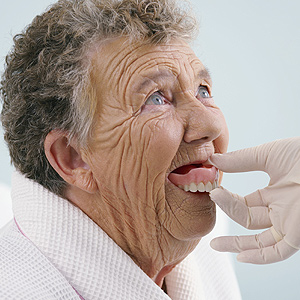When you first received your removable dentures the fit was firm and comfortable. Lately, though, they’ve become loose, making it difficult to eat or speak without slippage.
The problem may not be with your denture, but with bone loss. Human bone goes through a natural cycle of dissolving (known as resorption) and new growth to take the lost bone’s place. The jawbone receives further stimulation to grow from the forces generated by natural teeth when we bite or chew.
When natural teeth are missing, however, the jawbone lacks this stimulation, which over time results in bone loss and gum tissue shrinkage. Traditional dentures can’t transmit this stimulating force to the jawbone either, so the bone and gum structure under a denture will also shrink. This results in a looser fit for the denture.
The simplest option to correct a loose-fitting denture (especially if it’s the first occurrence) is to reline the dentures with additional material to re-form the fit to the new conditions in the mouth. A permanent relining will require sending your dentures to a dental laboratory to apply the new material based on a mold of your current anatomy beneath the denture.
If, however, your dentures have already undergone a few relinings, or after examining your gums we determine a relining won’t provide the fit and stability needed, then it may be time for a new denture. Although this is more costly than a relining, a new appliance could provide a more accurate fit to the current contours in your mouth.
The latter option may also give you a chance to benefit from advancements in denture technology or materials since you received your current denture. One such advancement is a removable denture that’s supported by implants. It’s possible to achieve this new supporting foundation for the denture with as few as two strategically-placed implants in the lower jaw.
If you’ve begun to notice denture looseness, be sure to make an appointment for an examination. From there, we can advise you on what will work best in your particular case.
If you would like more information on your options regarding removable dentures, please contact us or schedule an appointment for a consultation. You can also learn more about this topic by reading the Dear Doctor magazine article “Loose Dentures.”




